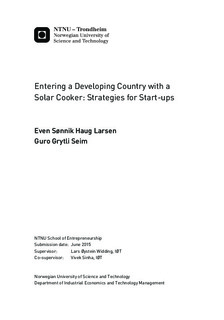| dc.description.abstract | Today, 2.7 billion people rely on biomass as their primary cooking fuel, leading to severe health and environmental impacts in many developing countries. Solar cooking represents a technologically viable alternative to the use of biomass, but scaling up the market has failed despite many years of efforts, mostly by non-profits, donor agencies and governments. Literature shows that there are several barriers to the adoption of solar cookers, where factors such as disruptiveness of the technology, high complexity and low purchasing power impedes the adoption rate. With the recent entry of private sector players in this industry, there is a need for better understanding which strategies can be utilized by new ventures in order to increase the adoption rate of solar cookers.
Starting with a literature review, theoretical ideas from diffusion of innovation in conjunction with market entry strategy and context specific literature are examined to investigate the barriers to adoption and the potential tactics that can overcome these barriers. By bringing together these different literatures, change agents are identified as a key resource in overcoming barriers to adoption. This is followed by a multiple case study that firstly investigates the current barriers to adoption, which barriers that can be met with the use of change agents, and thirdly how start-ups in the solar cooking industry can acquire appropriate change agents to overcome barriers to adoption.
This thesis contributes both to theory and practice; Firstly, it contributes to the theory of diffusion of innovation by suggesting that the general definition of an ideal change agent may not be applicable to all contexts. The authors propose that the scope of change agent characteristics potentially should be broadened to some extent when applied to developing markets. Secondly, it contributes to the theory of market entry strategy, as this thesis widens our understanding of the appropriate entry modes for start-ups entering such markets. It suggests that external modes might be preferred for start-ups entering developing markets, due to the high market risk and start-ups lack of internal resources.
Relevant for practitioners, this thesis recommends start-ups to acquire appropriate change agents through an external change agency that is followed up closely by the start-up. The specific characteristics of appropriate change agents for this context is also suggested, proposing to use female change agents with high status and high local and technical knowledge, that are trusted in the communities. The thesis thus gives a recommendation and a tool kit to start-ups, to help them choose the most appropriate entry strategy. This, the authors suggest, will help the start-up in overcoming barriers to adoption.
With the growing importance of the solar cooking market and its significance especially for the diffusion of environmentally friendly technologies and related impacts, this is a step towards understanding business strategies for complex environments. By proposing specific strategies to overcome barriers to adoption in the solar cooking industry, this thesis contributes towards a better approach to solve a long-standing problem in the sector. | |

